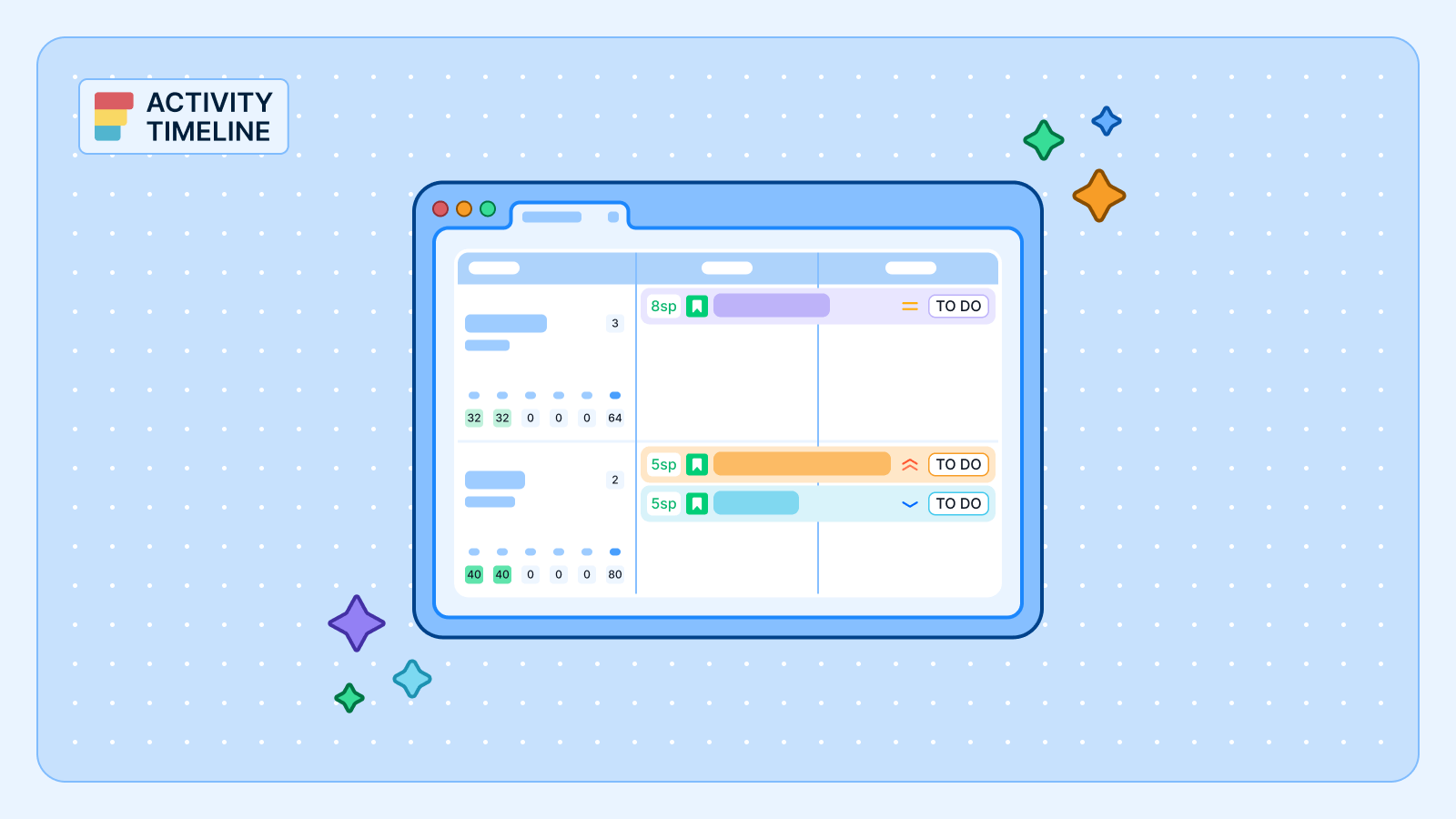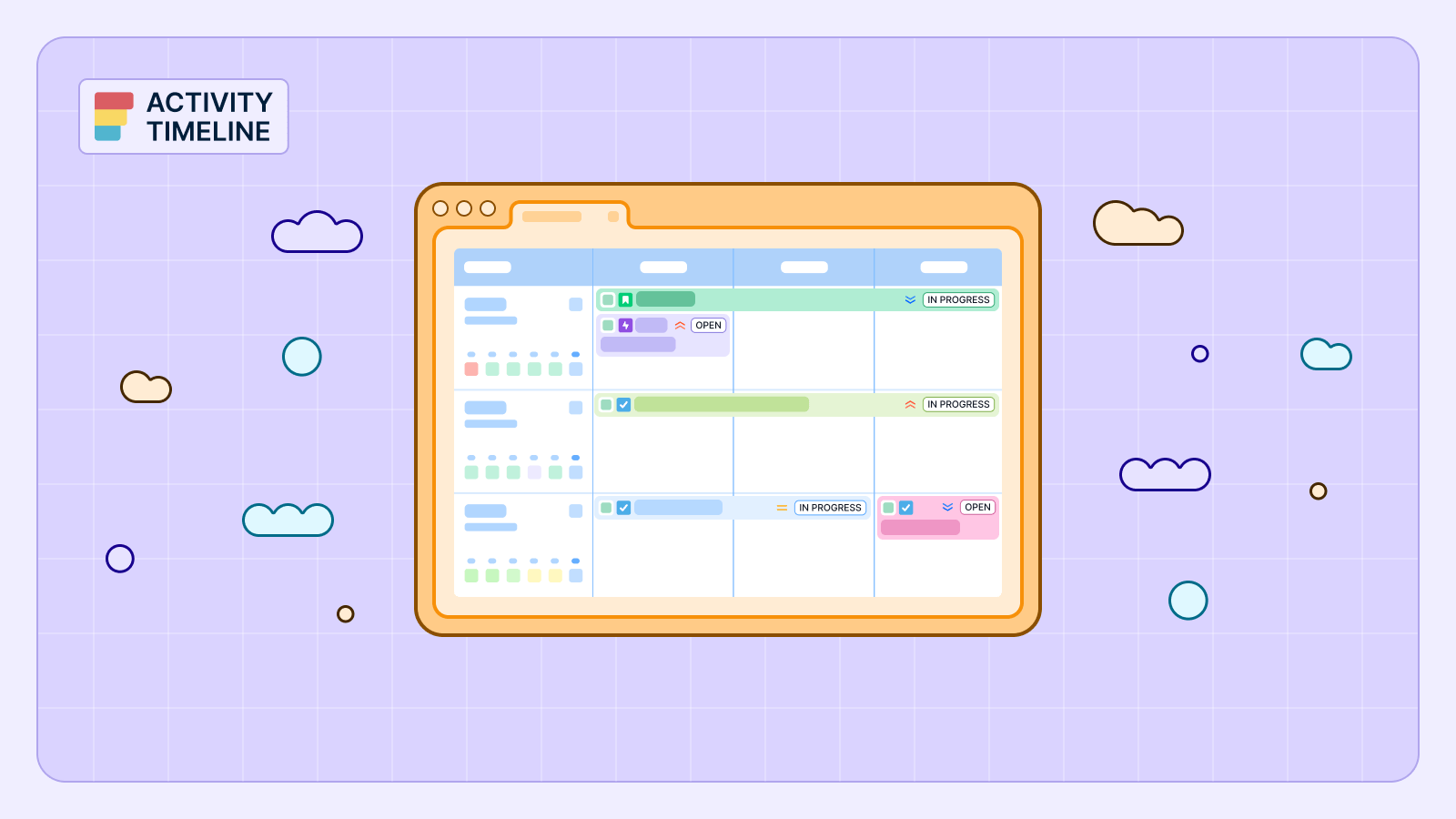Time tracking can be an incredibly valuable tool for teams, helping them to better understand how they’re spending their time and allocate resources accordingly. Logging work in Jira is easy with the right strategies. However, it's important to follow some best practices when doing so. This article provides you with tips on how your team can make sure that their logged data into Jira is accurate and up-to-date and gives a review of ActivityTimeline for Jira as a great time tracking solution.
{{tl-dr}}
Explanation of the Jira Work Log feature
Jira is a popular project management tool used by businesses and teams of all sizes. It helps with planning, tracking progress, managing tasks, assigning workflows, organizing team workflow, tracking time, and prioritizing projects so that they can be completed on time. A key feature of Jira is the ability to log work hours for each task or user within your specific Jira instance. This allows better visibility into who has worked on what tasks and how long it took them to complete them. It also gives you insights into whether any particular task was accomplished over-budget or under-performed.
What's the Importance of Logging Time in Jira?
Logging work hours is extremely useful for project managers who need to monitor the progress of each team member. Tracking logged-in data allows you to identify the following:
Track tasks
Tasks that take longer than expected are adjusted accordingly. You can track the time taken to work on each task and whether it was completed within the estimated timeline. This gives you insight into how much effort a team member is putting in, what tasks they’re prioritizing, and how quickly they are progressing through their workload.
Track progress
See how long each task takes compared to the estimated time frame for completion. Tracking project progress with different Tracking project progress and understanding which tasks take longer than expected will allow you to adjust your timeline accordingly and reach deadlines faster.
Estimate future efforts
Compare logs from previous projects with current ones to accurately accurately estimate the effort required for upcoming initiatives; this also allows teams to anticipate problems before they occur.
Assign tasks more accurately
Have a more in-depth understanding of how much time certain tasks take so you can assign them accordingly. It allows you to identify which resources are being used for different projects so that decisions about resource allocation can be made more efficiently. It also makes budgeting easier by keeping track of the total amount of time spent on any given project or task.
Track progress and performance
See who is working on which task, as well as monitor their activity levels over time. It will also help in identifying areas where people are not meeting their goals or are underperforming on specific tasks. This information then can be used for making decisions about team members future assignments and performances within the organization.
The time logging also helps teams stay transparent with their clients as they can provide accurate reports on time spent when requested. It helps ensure employees are not overworking themselves which can lead to burnout resulting in decreased productivity levels over time if left unchecked.
Strategies for Encouraging Employees to Log Work in Jira
By 2025, 70% of large companies have adopted tracking, yet 59% of employees report anxiety and 56% feel increased stress. Although Jira is an excellent tool, it is a reality that many employees still don’t enjoy logging their work hours. This is why you must make the process as easy and enjoyable as possible.
Why is it hard to get accurate work hours from my team?
Many employees see manual logging as a distraction or a form of micromanagement. Team members might not fully understand how to log time or find the manual process too time-consuming. If the process is too complex, they often wait until the end of the week and guess their hours, which leads to errors.
The following strategies help your team improve their time-tracking habits:
Inform the team
Make sure everyone knows they must log their time. This means setting expectations from day one and reiterating them throughout the project duration when necessary.
Encourages and rewards
Reward those who log their time consistently. Use small incentives like gift cards to recognize a job well done. This acts as motivation for others too.
Flexibility and deadlines
Allow employees flexibility when they enter data into Jira. There should be no penalty if an employee does not enter every single task immediately after completing it. Instead, set clear deadlines for entries (e.g., at least once per week).
Teach employees how to log work in Jira
Train your team on how to use the Jira log work dialogue and make sure they understand why it’s important. This helps them feel more comfortable with the process, which can lead to better compliance overall.
Remember the details
Ensure that employees log all their time, including breaks or any other task taken away from actual project tasks (good practice to track non-billable hours in Jira add-ons). Tracking non-billable hours increases transparency and improves accountability within the team.
Best Practices for Logging Work in Jira
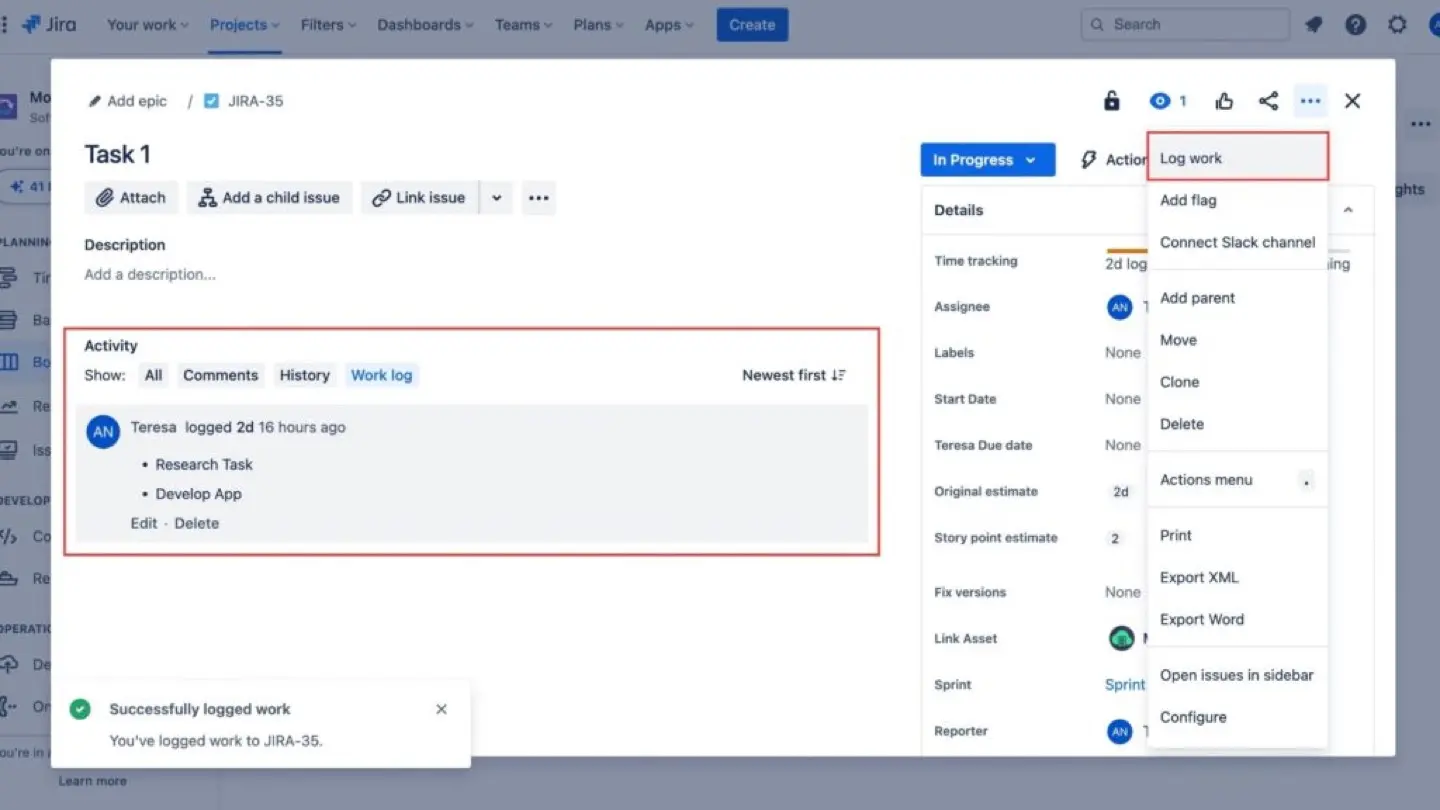
Once you have the strategies in place to encourage employees to log their work hours into Jira, it’s important to guarantee that they are following certain best practices. Here are some tips on how your team can make sure their entries into the system are accurate and up-to-date:
Jira Log Work as a habit
Make sure every task is logged as soon as it’s completed. This helps avoid any discrepancies between what was entered late versus early or inaccurately.
Grouping
Group similar tasks together for easier navigation and faster entry. For example, if multiple bug fixes were needed during a given day, group those all under one task instead of each having its own individual entry. This will also help with accuracy since everything related can be found quickly without much effort expended by anyone else looking at the logs later on.
Detailed Descriptions
Include a detailed work description of each activity so that other members (or managers) understand exactly what has been done.
Data Accuracy
Check that the time logged into Jira is accurate and up-to-date. You can use the "Edit" function to clarify vague descriptions or log work during transitions to "Resolved" to capture final efforts. Reviewing "Time Tracking" reports helps the team compare original estimates with actual time to improve future planning.
Automate
One of the primary questions often asked is, how can I simplify time logging for software tasks? Automation is the most effective answer. Take advantage of any app integration features within Jira to help streamline the process. For example, if using a chatbot, make sure it can be connected with your Jira work log system so entries are created automatically.
Use Additional Fields
Also, consider using optional fields such as tags or labels for each task, which could provide additional insight into how tasks were completed and why certain decisions were made while completing them (this helps identify trends over time too).
Establish Baseline Estimates
Setting an "Original Estimate" before starting work is the first step toward accurate tracking and sprint planning. Use standardized units like weeks (w), days (d), hours (h), or minutes (m). Assigning estimates to sub-tasks also ensures a more precise view of the total effort at the parent level.
Consistency in Logging Work
Logging should happen daily. Make sure each employee takes a few minutes to enter their data for the day, as it helps create accurate records that can be used for future reference or projects. A good practice is to explain to employees why we need time tracking.
Log Work in Jira: Common Mistakes to Avoid
Even with the best practices in place, mistakes can still occur while logging work hours into Jira. Avoiding the following errors will help maintain the quality of your project data:
Delaying task entries
If entries aren’t completed within 24 hours after a task is finished, it becomes harder to remember all the associated details and accuracy may suffer as a result
Inaccurate time estimates
Make sure you don’t underestimate how long something will take when creating an estimate; this could lead to missed deadlines or incomplete projects, which no one wants.
Also, many people fail to use the "Adjust Automatically" option correctly. Choosing the wrong adjustment method can leave the remaining estimate inaccurate, which makes it difficult for managers to see the true status of the project.
Forgetting to log breaks
Although taking breaks throughout the day is important (they help refresh our minds!), they should also be logged as such on Jira. This ensures that everyone knows what has been accomplished at any given moment.
Neglecting optional fields
Taking advantage of additional features such as specific comments can provide even more insights into why certain decisions were taken during different stages of development. These fields should not be neglected, as they provide necessary context for anyone reviewing the logs later.
Advanced Techniques and Tips for Jira Log Work
Once the basics of logging work in Jira have been mastered, it’s time to move on to more advanced techniques and tips. Here are a few ways you can improve your team’s performance even further:
Analyze logged data
Analyze logged data to identify any areas where improvements could be made. This includes looking at things such as the amount of time spent on a certain task, which tasks took longer than expected, or even individual performance over long periods of work. ActivityTimeline add-on provides deep-dive analytics and resource reports that simplify this evaluation process.

How can I generate a 'Planned vs. Actual' report for my Jira projects? You can use native Jira reports or add-ons to compare original estimates with actual time spent. The ActivityTimeline add-on provides comprehensive views of these discrepancies to help you refine your future planning.
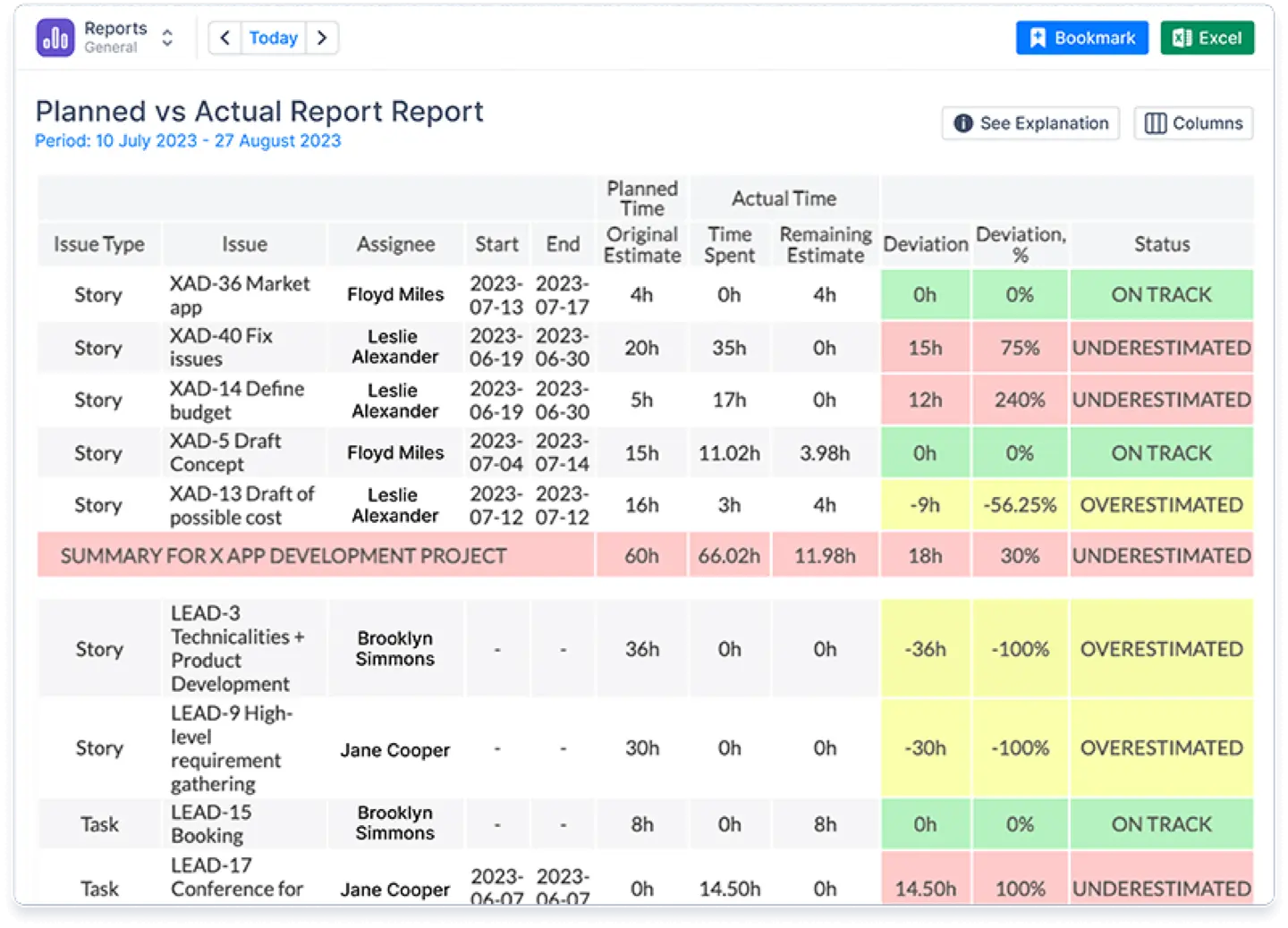
Visualize the team’s progress
Create custom charts in Jira that can help visualize your team’s progress and make it easier for managers to understand how each person is contributing.
Use an Add-on
Using a plugin like ActivityTimeline can help automate the process. It makes it easier to log time, provide reports and get insights into team performance quickly.
IMCD Group adopted the tool to standardize time tracking across their global IT department. By streamlining the approval workflow, they reduced invoice processing time from five minutes to just one. This improvement saved each manager approximately five hours every month, allowing them to focus on higher-value tasks.
Set a reminder
Set up reminders if someone forgot to log their hours on time; this will keep everyone accountable and guarantee that no deadlines are missed due to negligence from any particular team member.
Automate the process
Use automatic time tracking wherever possible with scripts or bots. They can save a significant amount of time by automatically logging and updating information without the need for manual input every single day.
Advantages of using ActivityTimeline to Work Log in Jira
ActivityTimeline is a popular add-on for Jira that allows you to better visualize your team’s work activity and get more insights into how well they are performing.
It helps provide an overview of tasks and resources allocated, as well as how long each task took (and whether it was completed within the budgeted hours/days). On the same Dashboard is a possibility for tracking time on the team and individual levels with a worklog indicators.
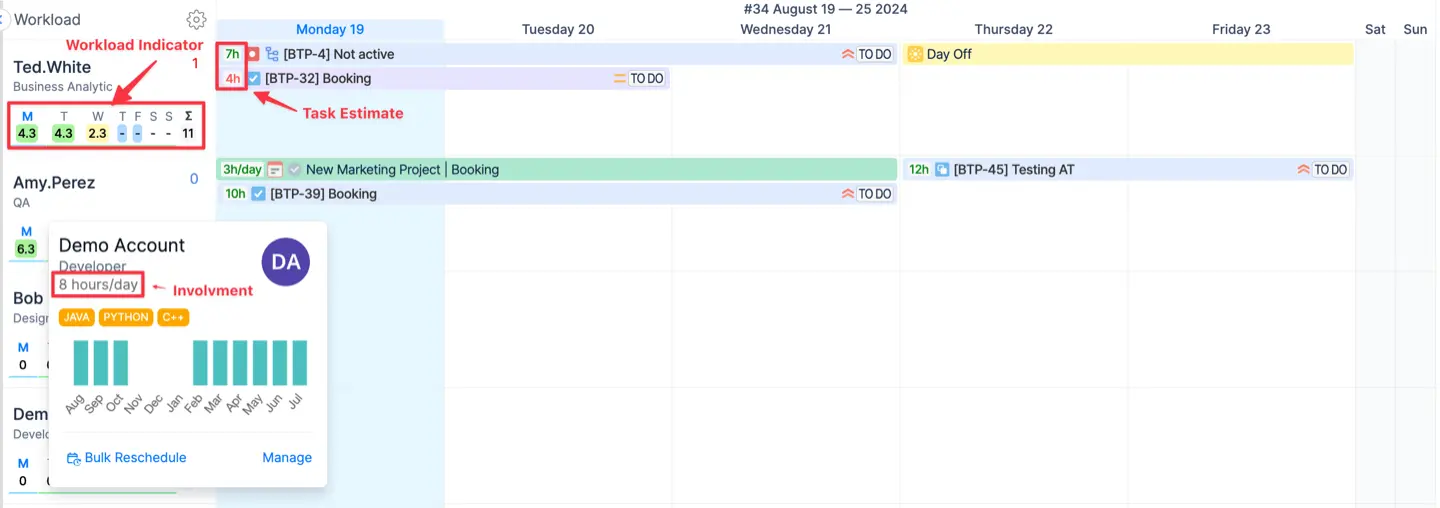
ActivityTimeline significantly improves the user experience by upgrading the standard Jira "Log Work" window. Users can categorize their time as Billable or Non-Billable directly from the issue page.
Many project managers eventually ask themselves, “Can I set up a custom 'Billable' vs. 'Non-Billable' dropdown for when my team logs work in Jira?” Fortunately, you can create up to 100 different categories in the Timesheet Configuration menu. Once ActivityTimeline is set as your Jira Time Tracking Provider, this dropdown will appear automatically in the log work dialog. It also allows for multi-day logging, where a single entry can cover tasks that span several days, which reduces manual data entry.
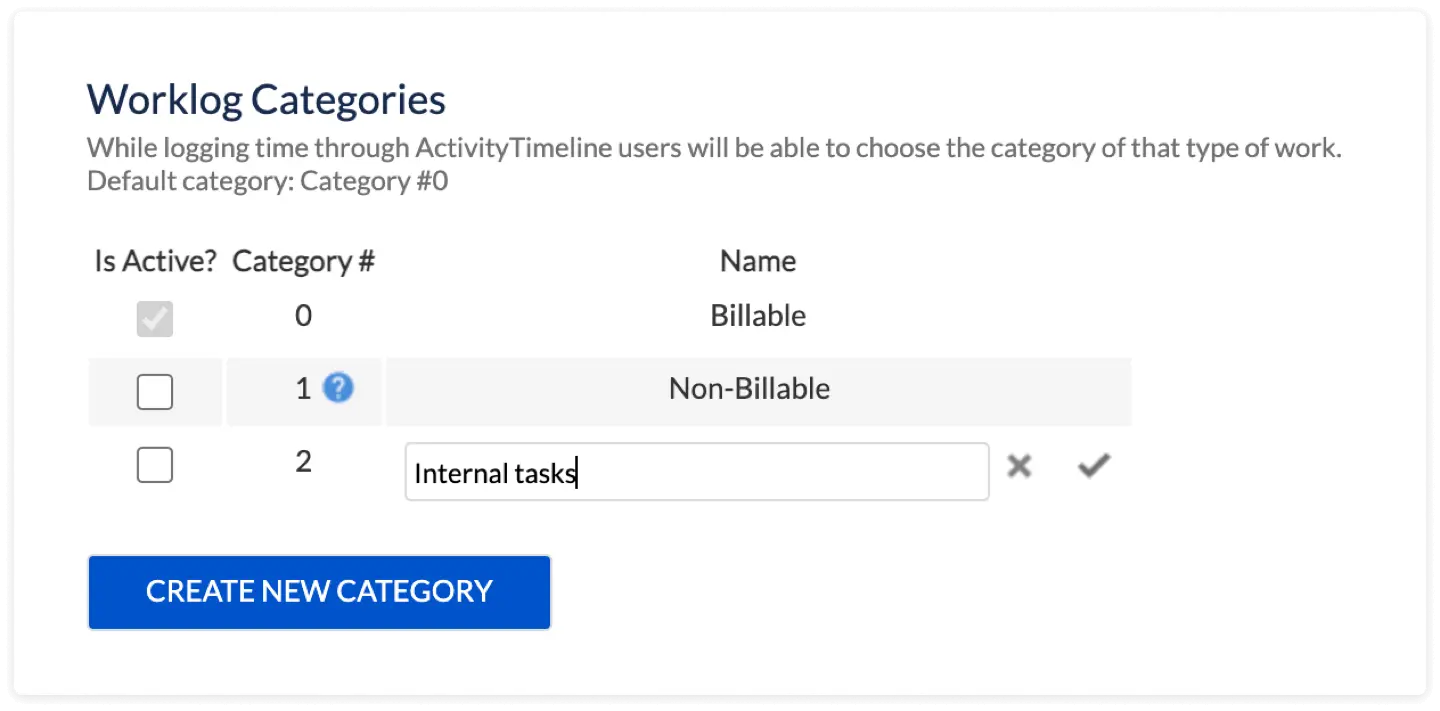
To make logging work as easy as pie, the user only needs to click on a ticket to log hours. ActivityTimeline will even automatically fill in the probable hours to save time.
For users, ActivityTimeline has a simple personal Workspace with a time tracking feature and editing worklog ability. On this Workspace, a user has the possibility to turn on the time tracker and when the task is finished to stop the time tracker and log work with one click:
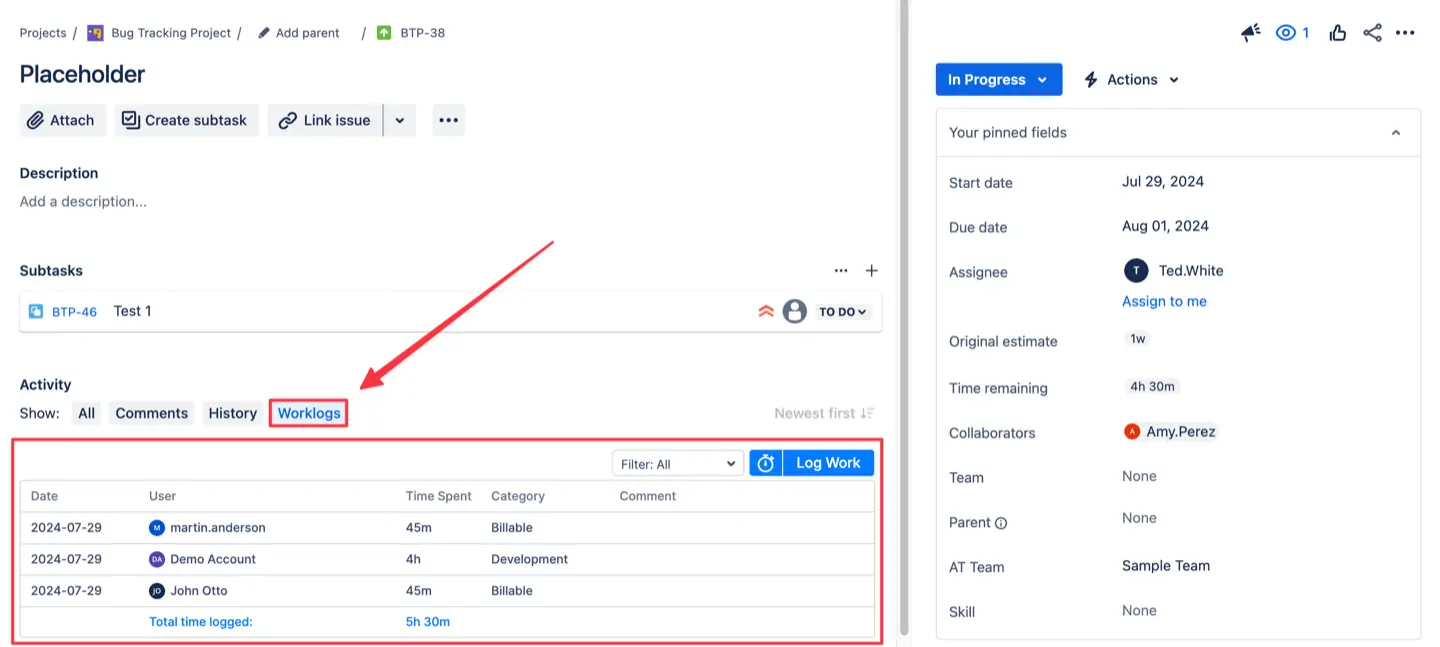
The tool provides a visual "My Schedule" module where users can manage worklog using drag-and-drop actions. You can move a worklog to a different day or resize the block to automatically create copies across multiple days.
You can track time for internal activities that do not have specific Jira tickets, such as meetings or training. ActivityTimeline can convert Booking Events into worklog and even integrate with Google or Outlook calendars to ensure that every hour of the workday is accounted for.
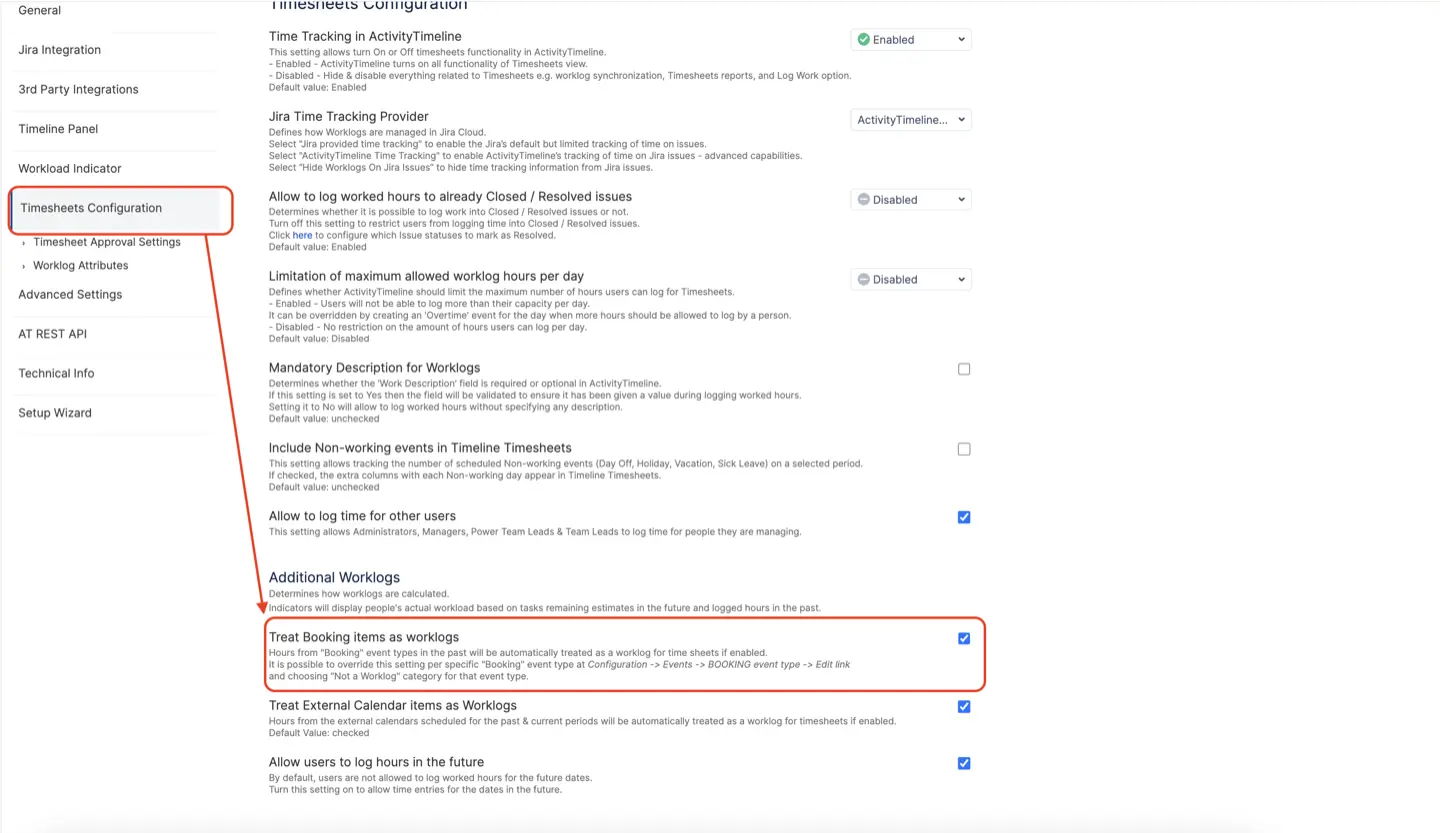
This plugin offers Timesheet reports which give managers an idea about where their projects stand at any given time so they can spot potential issues quickly before they become real problems. If you have ever wondered, "I need to export a resource utilization report from Jira to Excel. How do I do that?" the solution is simple. Generate a Resource Utilization Forecast in the Reports module; then use the export button in the top-right corner to download the file for further analysis.
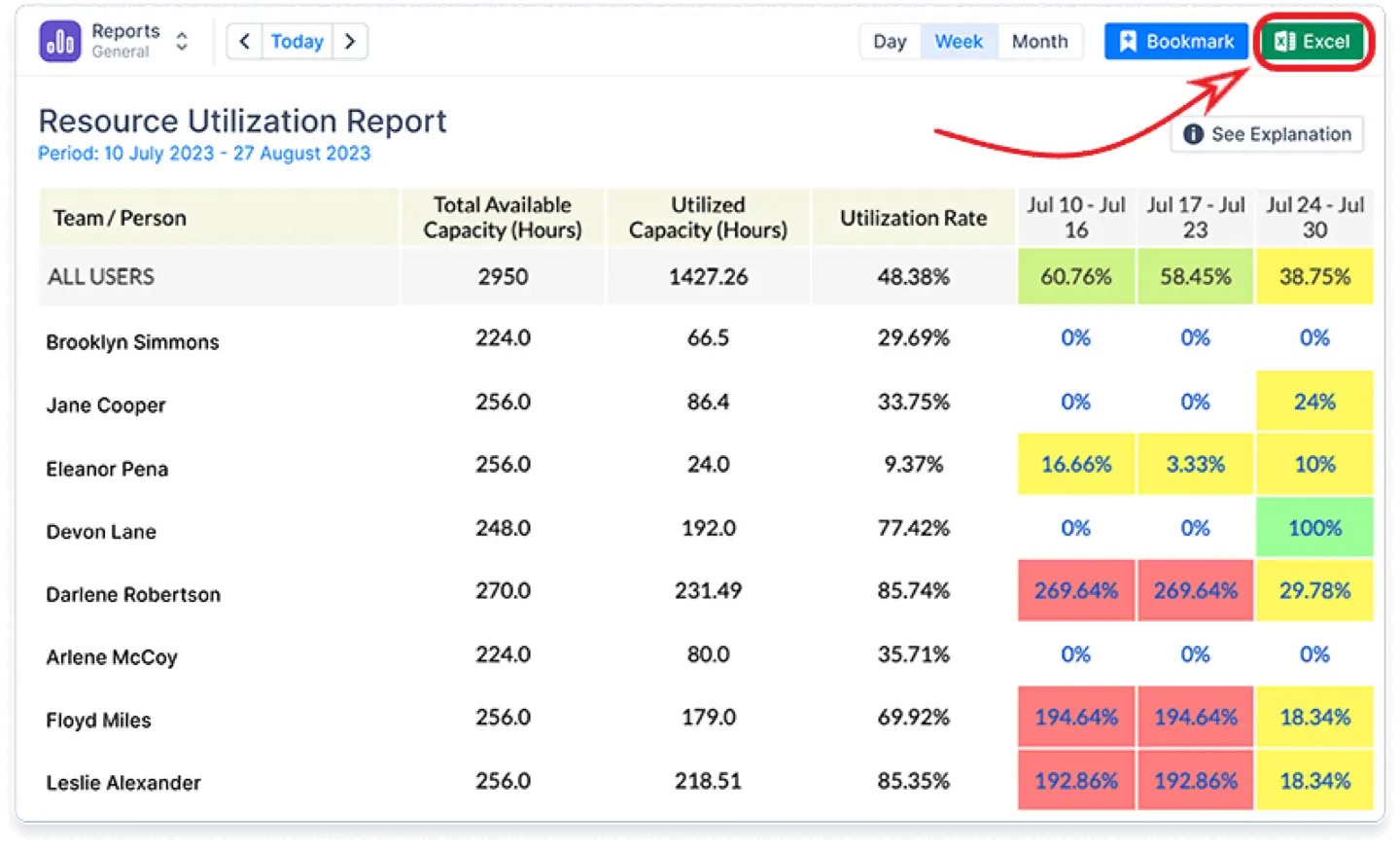
Managers can review and approve a logged time if needed. It can be useful for overtime hours. This feature is called Approval Workflow, it locks worklog once they are approved to ensure data integrity for payroll or client invoicing. Managers also have access to high-level tools, including the ability to log work on behalf of team members to fix reporting gaps.

Final Thoughts
ActivityTimeline for Jira helps teams manage their time and resources more effectively. It provides an easy way to Jira log work tasks, generate timesheet reports, and track individual team performance in one unified visual dashboard. This tool brings structure and operational clarity to teams, regardless of their size. By using the ActivityTimeline plugin for Jira, you can make sure that all the hours spent on projects are accounted for accurately and efficiently. It remains a vital instrument for overseeing complex projects and optimizing overall resource management.









